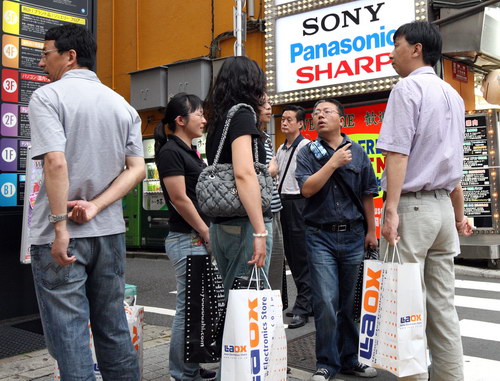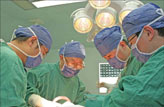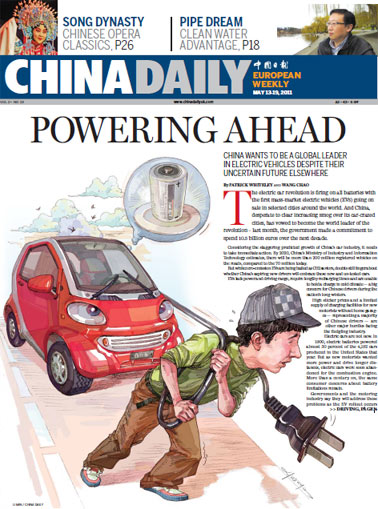Economy
Japan's tourism recovery pins hope on China
Updated: 2011-05-16 10:21
By He Wei (China Daily)
 |
|
Tourists from China stand outside a Laox Co shop in the Akihabara district of Tokyo. Chinese shoppers in Akihabara outspend all other overseas shoppers, according to the local tourism body, parting with more than four times more cash than their US counterparts. The district's stores are hiring Mandarin and Cantonese speakers and putting up two-meter tall billboards to bolster tourism. [Photo/Agencies] |
SHANGHAI - Japan, keen to rebuild its tourism industry, is expecting the number of Chinese visitors to level off within six months after steep decreases since March, a senior official from Japan's tourism authorities said.
The country's national and local governments will pull together to dispel the gloom in its inbound tourism sectors, which is set to be responsible for 2.2 percent of Japan's gross domestic product and 2.3 percent of employment this year.
By making a strong presence at the Eighth World Travel Fair in Shanghai last week, tourism executives from nearly 20 Japanese organizations vowed to restore the confidence of the Chinese market, which comprises the second-largest tourist inbound source.
Katsuaki Suzuki, director of Japan National Tourism Organization's (JNTO) Shanghai office, said the government, among other endeavors, prioritized updating the latest detailed and accurate information about travel in Japan to dismiss people's concerns.
"Most of Japan's regions are unaffected by the disaster, and we invite you to see the present condition of Japan by yourselves," Suzuki said.
Suzuki said the representative offices in Shanghai, Beijing and Hong Kong serve to send promotional activities to leading travel agencies. Latest events have included a 20 percent accommodation discount in Tokyo and discounted travel passports tailor-made for foreign visitors, according to JNTO's website.
Receiving 1.41 million Chinese visitors last year, Japan has set an ambitious target of regaining its popularity by the outset of next year, Suzuki added.
A mere 352,800 foreigners arrived in Japan in March, 50.3 percent fewer than the same month in 2010 and the largest decline ever recorded, according to the Japan National Tourism Board.
The catastrophic nuclear leak at the Fukushima Daiichi power plant has left northeast Japan the hardest hit area. Shuhei Sakamoto, director of the region's tourism promotion organization, said it would invite Chinese media and tourism professionals to visit Japan from September.
"We wish you to observe first-hand how Japan is still a unique and attractive travel destination and, by word of mouth, pass this information to the public," Sakamoto said.
Southwest island Kyushu, while less exposed to the nuclear radiation, still saw a precipitous drop in the number of visitors.
To reinvigorate the local economy, governors of the seven prefectures on Kyushu island will visit China's National Tourism Administration in Beijing and Shanghai Municipal Tourism Bureaus, said Yang Lin, assistant manager of the overseas division of the Kyushu tourism promotion organization.
Ishihara Susumi, its tourism chief, has made reassurances about safety in an open letter to overseas tourists and invited people to enjoy the cherry blossom season.
"We continue to welcome visitors from all over the world with an unchanging spirit of hospitality," the letter read.
The UN World Tourism Organization has downplayed fears about traveling to and from Japan as radiation levels at the country's airports and ports are "well within safe limits".
However, Fumihiko Sugino, director of Japan-headquartered Meitetsu World Travel Inc in Shanghai, said his company witnessed a downward spiral in business as travelers canceled bookings right after the incident.
"All reservations for hotels and shuttle buses are called off, and not a single deal was made in March (after the quake)," Sugino's assistant told China Daily.
Despite the sizable hit, Sugino remained optimistic for recovery as the first group of 40 Chinese passengers landed in Japan on April 29.
Suzuki also forecast a rosy prospect for a quick rebound.
"Very much like the 2003 SARS pandemic that panicked international travelers to China, the rebound showed blowout growth. We hope it is the same case with Japan this time," Suzuki said.
E-paper

Green works
Wuxi becomes 'test case' for facing country's environmental challenges
The global rise of Chinese brands
China-EU trade on solid ground
ZTE banks on innovation
Specials

The song dynasty
There are MORE THAN 300 types of Chinese operas but two POPULAR varieties are major standouts

Cut above the rest
One of the world's oldest surgeons has performed more than 14,000 operations

From the ground up
Architect of Guangzhou Opera House has many projects under way, including 2012 Olympics.




